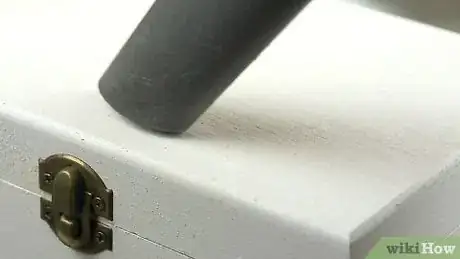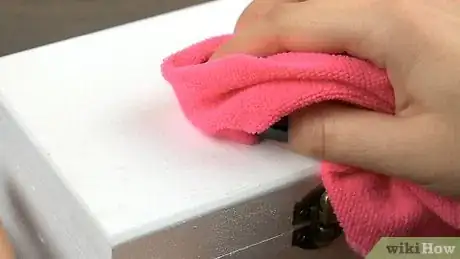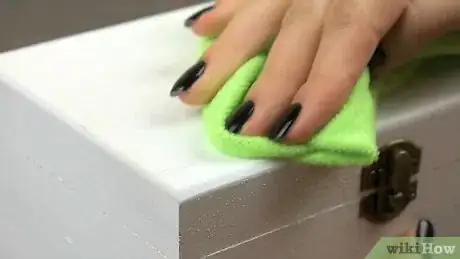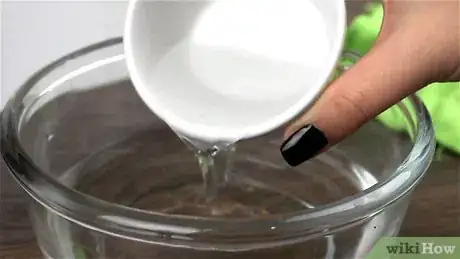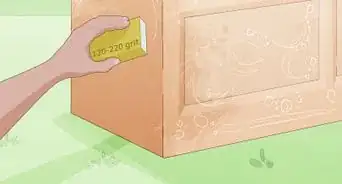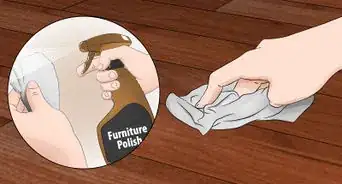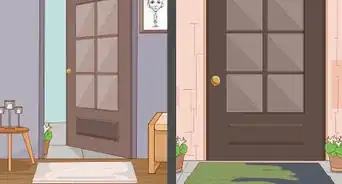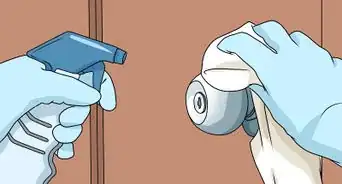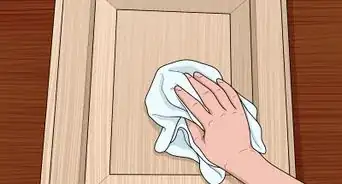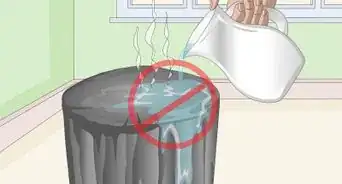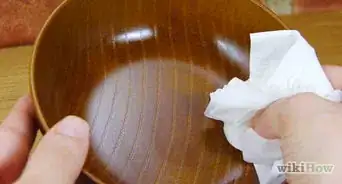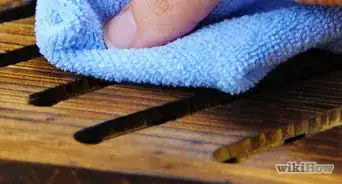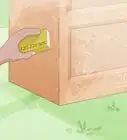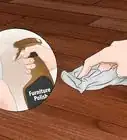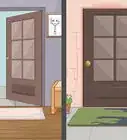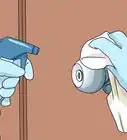This article was co-authored by Dario Ragnolo and by wikiHow staff writer, Janice Tieperman. Dario Ragnolo is the Owner and Founder of Tidy Town Cleaning, a home cleaning service in Los Angeles, California. His business specializes in residential & commercial cleaning. He is a second generation home cleaning expert, who grew up around his parents cleaning business in Italy.
There are 7 references cited in this article, which can be found at the bottom of the page.
This article has been viewed 63,662 times.
Painted wood comes in many forms, whether it’s a cabinet, baseboard, or other household object. While these items don’t require a lot of maintenance, it’s important to give these surfaces a proper cleaning once every few months. When cleaning these surfaces, create a soapy mixture with dish soap and warm water, then wipe down the painted wood surface. If you’d prefer a cleaning alternative, feel free to use vinegar or ammonia instead. With a little bit of TLC, your painted wood fixtures will be squeaky clean in no time!
Steps
Using Soapy Water
-
1Vacuum up any excess dust around the area. Use the tube attachment with your vacuum cleaner to suck up any obvious dirt, dust, and grime along the edge of your painted wood. If you don’t have a vacuum or vacuum extension, try using a broom to sweep away the obvious dust.[1]
- The cleaning process can be a lot more thorough if you don’t have to worry about dust later on.
Tip: If the painted wood surface isn’t especially dusty, don’t worry about using a vacuum or broom. Instead, wipe away any obvious dust with a baby wipe.[2]
-
2Squeeze dish soap into a bucket of warm water. Fill a medium-sized plastic bucket or basin with 2 to 4 inches (5.1 to 10.2 cm) of warm water. Take a bottle of dish soap and squeeze a small amount into the container, or wait until suds start actively forming.[3] Don’t use a dishwashing detergent, as this will be too harsh on your painted wood surfaces.[4]Advertisement
-
3Soak a microfiber cloth in the mixture and wring it out. Take a soft, gentle cloth and submerge it into the soapy mixture. Make sure that all of the fabric is drenched before removing it from the suds.[5] Finally, squeeze the microfiber cloth out so that it’s no longer dripping wet.[6]
- Aim for the fabric to damp, but not sopping.
- Never use steel wool or anything abrasive to wipe down a painted surface.
-
4Wipe down the wood in smooth, circular motions. Take the damp cloth and rub it along the painted wood, working to reach the edges and corners, as well. Move the rag in small, circular motions as you remove any obvious dust from the surface.[7] Try working from left to right to ensure that you clean off the entire painted surface.[8]
Tip: Dip a clean cotton swab into the soapy water and use it to clean nooks and crannies, like the thin, top portion of a baseboard.[9]
-
5Wet another cloth and squeeze out any excess water. Place a different microfiber cloth beneath a stream of cool, running water. Wait until the rag is completely saturated before squeezing it out over the sink. Aim for the material to be damp, but not dripping wet.[10]
-
6Rub the wet rag across the cabinets to get rid of the cleaning solution. Take the water-soaked microfiber cloth and focus on wiping up any excess suds. Wipe from left to right, working your way down the surface until all remnants of the soap are gone.[11]
- If you don’t wipe down the soapy solution, then your painted wooden surfaces will be sticky.
-
7Dry off the surface with a dry microfiber cloth. Take a third cloth or rag and wipe it across the washed surface in long, circular motions. Continue from left to right, working your way from top to bottom until the item is dry to the touch. Be sure to use clean cloths for this process, so you don’t spread more dirt and grime to the painted wooden surface.[12]Expert AnswerQ
Can I just let my wood floor air dry after I've mopped it?
Dario Ragnolo is the Owner and Founder of Tidy Town Cleaning, a home cleaning service in Los Angeles, California. His business specializes in residential & commercial cleaning. He is a second generation home cleaning expert, who grew up around his parents cleaning business in Italy.House Cleaning Professional
 EXPERT ADVICEAnswer from Dario Ragnolo:
EXPERT ADVICEAnswer from Dario Ragnolo:No, you have to actively dry the wood with a clean cloth. Letting the wood air dry can lead to water damage it in the long run.
Trying Other Cleaning Agents
-
1Choose vinegar or all-purpose cleaner instead of dish soap. Fill a medium-sized container with 2 to 4 inches (5.1 to 10.2 cm) of warm water. If you don’t have any dish soap on hand or would prefer to use a different cleaning, opt to mix 2–4 tablespoons (30–59 mL) of white vinegar or all-purpose cleaner into a container. Whenever you use either of these ingredients, check to make sure that they’re diluted.[13]
- Try not to apply vinegar or all-purpose cleaner directly to painted wood.
-
2Use a diluted ammonia mixture to get rid of stains. Mix 1 part ammonia with 8 parts water in a small container, stirring the ingredients together until they’re completely combined.[14] Dip a microfiber cloth or washrag into the ammonia mixture, instead of using the rag soaked in the cleaning solution. Use small and concentrated circular motions to remove greasy stains and other sections of dirt and grime.[15]
- If you’d prefer not to use ammonia, try using a baking soda paste instead.
-
3Freshen up baseboards with a dryer sheet. Instead of using a dry microfiber cloth, take a clean dryer sheet and drag it along the surface of the baseboard. Continue swiping along the painted surface until you’ve wiped the entire trim.[16]
Did you know? Moldings don’t require as much intensive maintenance. Use an extendable duster to remove any obvious dirt and grime, and wipe off the painted surface with a baby wipe.[17]
Expert Q&A
-
QuestionWhat kind of cloth should I use to spot-clean wood?
 Dario RagnoloDario Ragnolo is the Owner and Founder of Tidy Town Cleaning, a home cleaning service in Los Angeles, California. His business specializes in residential & commercial cleaning. He is a second generation home cleaning expert, who grew up around his parents cleaning business in Italy.
Dario RagnoloDario Ragnolo is the Owner and Founder of Tidy Town Cleaning, a home cleaning service in Los Angeles, California. His business specializes in residential & commercial cleaning. He is a second generation home cleaning expert, who grew up around his parents cleaning business in Italy.
House Cleaning Professional Any kind of soft cloth will do the trick. A lot of folks prefer microfiber cloths since they're basically guaranteed to not scratch your wood.
Any kind of soft cloth will do the trick. A lot of folks prefer microfiber cloths since they're basically guaranteed to not scratch your wood.
Things You’ll Need
Using Soapy Water
- Vacuum
- Vacuum tube attachment
- Broom (optional)
- Baby wipes (optional)
- Small container
- Warm water
- Dish soap
- Sponge
- Cotton swabs (optional)
- Microfiber cloths
Trying Other Cleaning Agents
- White vinegar
- All-purpose cleaner
- Water
- Liquid ammonia
- Bucket
- Baking soda (optional)
- Microfiber cloths
- Dryer sheets
References
- ↑ https://www.today.com/home/how-clean-moldings-your-home-t129501
- ↑ https://www.readersdigest.ca/home-garden/cleaning/extraordinary-baby-wipe-uses/
- ↑ Dario Ragnolo. House Cleaning Professional. Expert Interview. 13 August 2019.
- ↑ https://www.thekitchn.com/how-to-clean-painted-wood-cabinets-248277
- ↑ Dario Ragnolo. House Cleaning Professional. Expert Interview. 13 August 2019.
- ↑ https://www.thekitchn.com/how-to-clean-painted-wood-cabinets-248277
- ↑ Dario Ragnolo. House Cleaning Professional. Expert Interview. 13 August 2019.
- ↑ https://www.thekitchn.com/how-to-clean-painted-wood-cabinets-248277
- ↑ https://www.bobvila.com/articles/how-to-clean-baseboards/
- ↑ https://www.thekitchn.com/how-to-clean-painted-wood-cabinets-248277
- ↑ https://www.thekitchn.com/how-to-clean-painted-wood-cabinets-248277
- ↑ Dario Ragnolo. House Cleaning Professional. Expert Interview. 13 August 2019.
- ↑ https://www.bhg.com/homekeeping/house-cleaning/tips/how-to-clean-cabinets/
- ↑ https://www.readersdigest.ca/home-garden/tips/5-things-do-ammonia/#13
- ↑ https://www.bhg.com/homekeeping/house-cleaning/tips/how-to-clean-cabinets/
- ↑ https://www.bobvila.com/articles/how-to-clean-baseboards/
- ↑ https://www.today.com/home/how-clean-moldings-your-home-t129501
